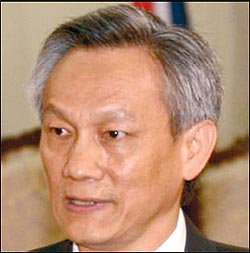We noticed a short report in the Bangkok Post on the “National Anti-Corruption Commission (NACC) yesterday released a list of assets and liabilities of two former Constitutional Court judges and three new ones.”
It caught our attention that former judge Jaran (sometimes Jarun) Pukditanakul was the wealthiest of the five.” The report states that:
Jaran and his spouse [Teepsurang Pukditanakul] have assets worth 206.1 million baht and debts of 22 million baht. Their assets include land plots in Songkhla’s Hat Yai worth 93 million baht while the debts include 14.9 million baht in loans from a woman identified as Jinda Sunthornpan.
The other judges, including a former president of the Constitutional Court, declared wealth much lower than this. We wondered why one judge and former Permanent Secretary of the Ministry of Justice was so much wealthier than his colleagues. We suppose there could be family reasons for this or he might have won the lottery. But it set us thinking.
Jarun came to his position at the Ministry of Justice following the 2006 military coup and was renowned not so much for his legal qualifications but for being anti-Thaksin Shinawatra. When it came to becoming a judge, a 2008 Asia Sentinel article had this:
In selecting the first four of the court’s nine judges, the Supreme Court this week chose Jarun Pukditanakul. He became permanent secretary of the Justice Ministry after the coup and was instrumental in drafting the military’s 2007 constitution that he will be tasked to uphold.
Jarun was involved in several cases that did the amart’s work on Thaksin and his parties, causing much conflict with the pro-Thaksin groups, including the Puea Thai Party. Jarun wasn’t in the court at the time of the dissolution of Thai Rak Thai, but he was one of those who publicly justified the application of a new law retrospectively. On justifying that at a briefing for the diplomatic corps, a US cable explained:
Ministry of Justice Permanent Secretary Jaran Pakdithanakul, who also serves as deputy chair of the Constitutional Drafting Committee (CDC), followed [Ministry of Foreign Affairs … Permanent Secretary Virasak Futrakul] by offering a detailed defense of the court case. Jaran explained that the Constitutional Tribunal was widely viewed as impartial and professional. No outside pressure or intervention influenced the judges’ decision. The charges against both TRT and the Democrat party were filed before the September 2006 coup. According to Jaran, the judges were unanimous in their finding of the facts of the case: that TRT leaders violated election law.
… Jaran acknowledged debate within the legal community–and the Tribunal–over TRT’s punishment. While election laws under the 1997 constitution provided for the dissolution of a political party guilty of legal violations, the revocation of certain political rights (voting, running for office) from 111 members of TRT’s executive board was established after the coup by the military leadership. Jaran admitted that this was a retroactive application of the law, but argued that, since this was not a criminal legal issue, it did not violate international legal norms.
This feeble “explanation,” justifying the unjustifiable, set in motion the double standards that have come to define Thailand’s judiciary.
This reminded us of the allegations of corruption at the court involving Jarun, money, relatives, commissions, covering-up and more, some of it caught on video and posted to YouTube. We won’t go back over it all, but we have added several links for those who are interested.
Of course, we wouldn’t dare say that all of this might be linked and that a pliant and supportive official-cum-judge might have been rewarded. Just saying that the links are interesting.

Leave a comment